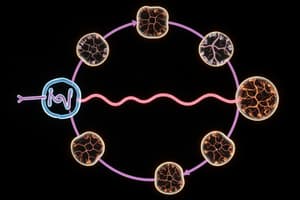Podcast
Questions and Answers
Which field applies chemistry to the study of biological processes at the cellular and molecular level?
Which field applies chemistry to the study of biological processes at the cellular and molecular level?
- Astronomy
- Physics
- Biochemistry (correct)
- Geology
What is the aim of biochemistry?
What is the aim of biochemistry?
- To study the stars
- To describe and explain chemical processes of living cells in molecular terms (correct)
- To analyze weather patterns
- To understand geological formations
What is the relationship between biochemistry and biomedicine?
What is the relationship between biochemistry and biomedicine?
- Biochemistry is only used for drug formulation
- Biochemistry is not used in biomedicine
- All diseases have biochemical bases (correct)
- There is no relationship
What are the basic building blocks of life?
What are the basic building blocks of life?
What are some characteristics of cells?
What are some characteristics of cells?
Which of the following is NOT an aim of biochemistry?
Which of the following is NOT an aim of biochemistry?
Which of the following is true about the field of biochemistry?
Which of the following is true about the field of biochemistry?
What is the relationship between biochemistry and diseases?
What is the relationship between biochemistry and diseases?
What is the smallest living unit of an organism?
What is the smallest living unit of an organism?
What are the basic building blocks of life?
What are the basic building blocks of life?
Flashcards
Biochemistry
Biochemistry
The study of chemical processes within living organisms, particularly at the cellular and molecular level.
What is the aim of biochemistry?
What is the aim of biochemistry?
To understand how chemical reactions drive life processes, from basic metabolism to complex biological pathways.
Relationship of Biochemistry to Biomedicine
Relationship of Biochemistry to Biomedicine
All diseases, whether genetic, infectious, or environmental, arise from disruptions in the body's biochemical processes.
What is the smallest living unit of an organism?
What is the smallest living unit of an organism?
Signup and view all the flashcards
What are the basic building blocks of life?
What are the basic building blocks of life?
Signup and view all the flashcards
Characteristics of Cells
Characteristics of Cells
Signup and view all the flashcards
Chemical Processes in Living Organisms
Chemical Processes in Living Organisms
Signup and view all the flashcards
Biochemistry and Diseases
Biochemistry and Diseases
Signup and view all the flashcards
What are the basic building blocks of life?
What are the basic building blocks of life?
Signup and view all the flashcards
What is the field of biochemistry?
What is the field of biochemistry?
Signup and view all the flashcards
Study Notes
Biochemistry
- Biochemistry is the field that applies chemistry to the study of biological processes at the cellular and molecular level.
Aim of Biochemistry
- The aim of biochemistry is to understand the chemical processes that occur within living organisms.
Relationship with Biomedicine
- Biochemistry is closely related to biomedicine, as it provides the foundation for understanding the mechanisms of disease and developing new treatments.
Basic Building Blocks of Life
- The basic building blocks of life are molecules such as carbohydrates, proteins, lipids, and nucleic acids.
Characteristics of Cells
- Cells are the smallest units of life and are characterized by their ability to grow, reproduce, respond to stimuli, and maintain homeostasis.
Non-Aim of Biochemistry
- One of the aims of biochemistry is NOT to study the physical structure of an organism.
Field of Biochemistry
- Biochemistry is a field that combines chemistry, biology, and physics to understand the chemical processes that occur within living organisms.
Relationship with Diseases
- Biochemistry plays a crucial role in understanding the mechanisms of diseases, as it helps to identify the underlying chemical changes that occur during disease progression.
Smallest Living Unit
- The smallest living unit of an organism is a cell, which is capable of reproducing and maintaining its own vital functions.
Studying That Suits You
Use AI to generate personalized quizzes and flashcards to suit your learning preferences.




